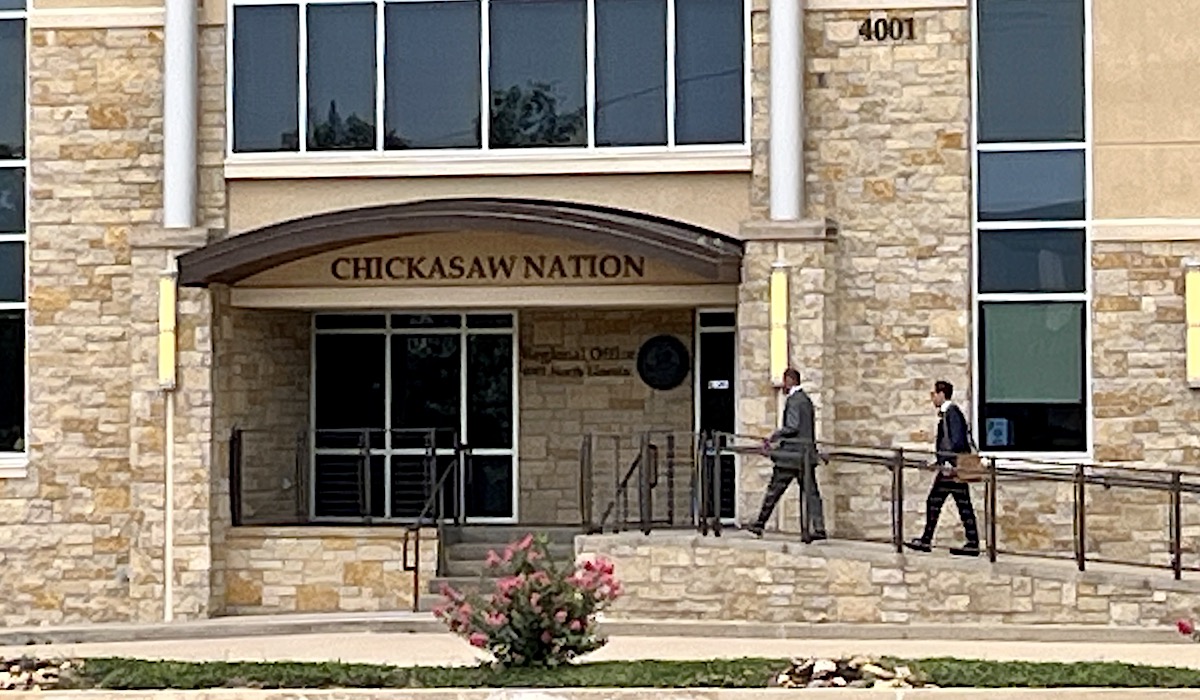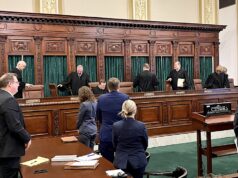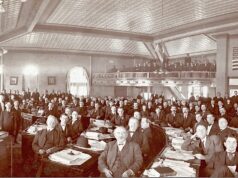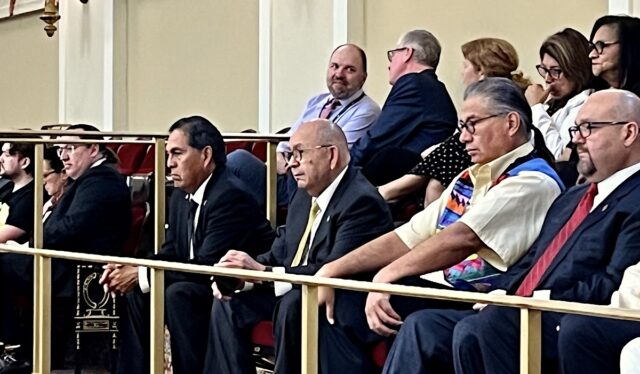
Beneath a gallery half-full of tribal leaders, the Oklahoma State Senate took a second swing at overriding Gov. Kevin Stitt’s veto of state-tribal compact extensions and connected Monday, nearly one month after senators fell one vote short of extending dozens of tobacco and motor vehicle compacts through Dec. 31, 2024.
Senate President Pro Tempore Greg Treat (R-OKC) immediately began the day’s events by moving to override Stitt’s veto of SB 26X, which proposed extending all existing state-tribal compacts on tobacco taxation one year
On June 26, the Senate voted 31-8 — one member shy of the necessary two-thirds supermajority — to override the SB 26X veto. Nine senators were absent that day, and Treat pledged minutes afterward that he would “have the votes” when he brought the Senate back for another attempt in July.
That attempt came today, and after 40 minutes of debate on SB 26X, senators voted 34-7 to override Stitt’s veto. Sen. Brenda Stanley (R-Midwest City), Sen. George Young (D-OKC) and Sen. Darrell Weaver (R-Moore) were absent on June 26 but voted in favor of the override Monday.
Minutes later, senators also voted 34-7 to override Stitt’s veto on HB 1005X, which extends existing state-tribal compacts on motor vehicle licensure through Dec. 31, 2024, as well.
“I’m certainly pleased by the vote. It gives us additional time to get this worked out. I believe that with that additional time we can do that,” Chickasaw Nation Gov. Bill Anoatubby said as he left the Senate gallery. “The conditions that existed before the compacts actually were signed years ago back in the ‘90s, it was pretty volatile. It was a pretty sad situation. Things changed when the compacts were put in place and everything normalized and we began to work together again. It was pretty volatile back then and we certainly would not want to repeat that.”
Choctaw Nation Chief Gary Batton offered a similar assessment.
“I’m really pleased with the tone that it set today,” Batton said, emphasizing that expiration of the tobacco compacts would negatively impact both tribes and the state financially in a manner similar to the expiration of hunting and fishing compacts at the end of 2021. “That’s money that will be lost for the state of Oklahoma and for the tribes because we’re competing against Arkansas and we’re competing against Texas, so why would we not want to continue providing revenue to the state of Oklahoma through these compacts like we have done in the past? It’s just like the hunting and fishing — $35 million was lost for the state of Oklahoma by not renewing those compacts with the tribes. We believe that’s a win-win whenever we can benefit and the state of Oklahoma can benefit.”
Seminole Nation Chief Lewis Johnson praised the vote taken by senators.
“I believe that throughout the history of this country and this state, we seek as native people to have fair and honorable dealings with the native tribes,” Johnson said. “The Senate upheld that today.”
Stitt, however, expressed frustration with the Senate’s decision.
“Despite real concerns for the future of our state, the Senate has chosen to disregard the governor’s compact in favor of compact language the tribes wanted,” Stitt said in a statement. “I am trying to protect eastern Oklahoma from turning into a reservation, and I’ve been working to ensure these compacts are the best deal for all 4 million Oklahomans. Unfortunately, the Senate seems to disagree and used an illegitimate process to do so.”
Asked what process used by the Senate was “illegitimate,” a Stitt spokeswoman did not respond prior to the publication of this article.
While the House was not in session Monday, they are expected to return July 31 to vote on the SB 26X veto override. House members had already voted to override the HB 1005X veto June 12.
‘I hope negotiations proceed expeditiously’
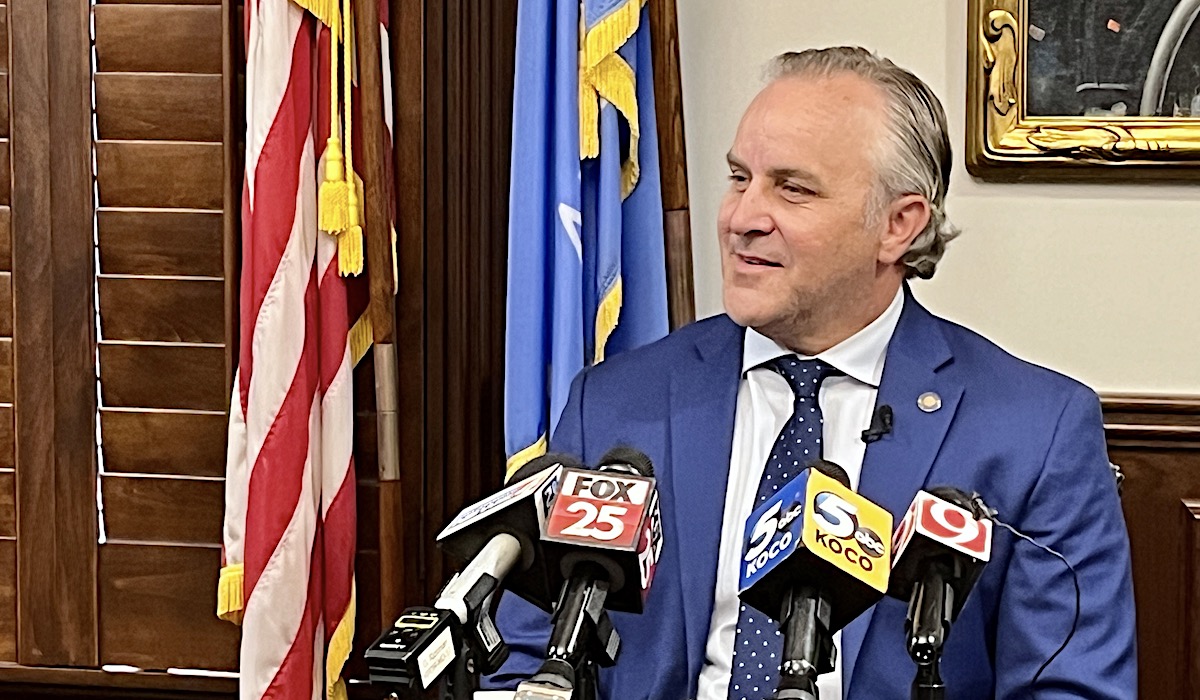
Tribal leaders spent recent weeks asking senators to override Stitt and extend from six to 18 months the time period for additional negotiation with the governor for a more-typical 10-year extension.
Stitt, meanwhile, lobbied senators to uphold his veto and support his negotiations on revised compacts, sending a last-minute email Sunday to senators in an effort to convince them he is sincere about negotiating new tobacco compacts. (On Thursday, representatives from Stitt’s administration met with representatives of the Chickasaw Nation regarding tobacco compact language.)
After Monday’s vote, Treat said he wants negotiations to continue sooner than later.
“I hope negotiations proceed expeditiously, but that has not happened heretofore in this administration,” Treat said. “So I’m not holding my breath for that, but my hope would be that we get earnest negotiations done rapidly.”
RELATED
‘Respectful cooperation’: Stitt, Anoatubby emails precede meeting of their representatives by Tres Savage
At Thursday’s meeting between Stitt’s representatives and Anoatubby’s representatives, former Oklahoma Supreme Court Justice Steven Taylor attended as a potential neutral third-party mediator. The meeting had been Anoatubby’s idea, and Taylor’s attendance had been Stitt’s.
Treat said Monday that he was not familiar enough with the negotiations to know whether Taylor should act as a formal mediator, but the Senate leader said Taylor was “undoubtedly a huge benefit to the education negotiations” that finally resulted in an agreement this May.
“I don’t know the details of where they’re at on the negotiation to know whether having somebody of the calibre of Justice Taylor is appropriate at this time or whether it would be more appropriate later,” Treat said. “I can’t honestly assess that.”
Anoatubby referenced Thursday’s meeting between his representatives and Stitt’s representatives.
“We decided that maybe it would be better if we got together in person so last week we had our first in-person meeting,” he said. “What I hope for is that we tribes — not just one tribe — can get together and work to get some common language and get an agreement.”
Batton concurred, although he noted that each tribe will want to make sure its specific interests are represented.
“I hope that all tribes will come together because I think we pretty well stand united in what we hope to accomplish like we’ve done in the past,” Batton said. “We want it to be good for Oklahoma just like it’s good for us. We believe that it’s revenue generation for the state and it’s revenue generation for the tribes and it’s a win-win situation, so that’s the spirit we want to continue moving forward.”
Treat made the motion to override the vetoes Monday, and he also closed debate on the SB 26X override.
“That has worked since the early 1990s. We were at each other’s throats,” Treat said, referencing a pair of U.S. Supreme Court cases that led to the current state-tribal compacts on tobacco taxation. “If you read what led to those legal cases (…) we were not getting along great, and we are heading down the path with a governor right now who doesn’t seem willing to negotiate these issues in good faith, in my opinion.”
Treat referenced the political pressure faced by senators ahead of the SB 26X veto override re-vote.
“I know there have been arguments from many people,” Treat said. “I’ve received texts this week from people who are not even in my phone database telling me how wrong I am and how I am going to destroy the state.”
To that end, three members of Treat’s Senate GOP Caucus debated Monday in an effort to uphold the governor’s vetoes. Sen. Nathan Dahm (R-Broken Arrow) reiterated the argument he made June 26, citing Article 6, Section 8 of the Oklahoma Constitution, Title 74, Section 1221 of state statute and the expiring compacts themselves to argue that the governor is the proper official to extend compacts.
“The compact itself says that the governor has the power to negotiate compacts. Not the Legislature, the governor. The constitution says the governor has the authority. Statute says the governor has the authority,” Dahm said. “If we want to change who has the authority, we have to do it legally. We cannot simply ignore the constitution. We cannot simply ignore statute. We have to go about it the right way. I believe these bills are not going about it in a constitutional manner.”
Treat said that if Stitt proves incapable of negotiating with tribal nations, he and senators could choose to take Dahm’s advice and change the law to designate the Legislature as the state’s negotiating representative on compacts.
“If this body finds that the governor is not negotiating in good faith, I reserve the right as the leader of this body, and you all reserve the right, to change that law,” Treat said on the Senate floor.
During his media availability afterward, Treat suggested that Stitt now has “almost a probationary period” of 18 months to negotiate more permanent deals.
Sen. Warren Hamilton (R-McCurtain) took Stitt’s side on the matter and said the historic U.S. Supreme Court decision in McGirt v. Oklahoma — which functionally affirmed the existence of eight reservations in eastern Oklahoma — has divided residents of the state. The decision’s immediate impact was for only the federal government and tribal governments to have jurisdiction to prosecute violations of the Major Crimes Act in cases involving tribal citizens. A subsequent Supreme Court ruling in Oklahoma v. Castro-Huerta said the state has concurrent jurisdiction on cases where non-tribal citizens commit crimes against tribal citizens. Beyond criminal law, however, the McGirt decision has raised legal questions about civil jurisdiction, including mining regulation and income taxation.
“Reservation by definition is set aside and reserved for certain people. Those people are Indians. Not everybody who resides within the confines of the reservation, at present, is an Indian,” Hamilton said. “Nevertheless, the letter of the law — which is what we’ve adhered to in the McGirt decision when we validated these things — takes us down a path that I don’t believe that we need to go down. And it’s a step in the wrong direction. It divides us along the lines of DNA, and every time that has been done throughout history, it has been a bad thing. It has never worked out well for those who have decided to do the dividing. The evidence and history points that this is a step in the wrong direction.”
Treat concluded his debate by emphasizing the need to get acceptable deals done.
“We must demonstrate an ability and a good-faith effort to be able to negotiate with these tribes,” Treat said.









